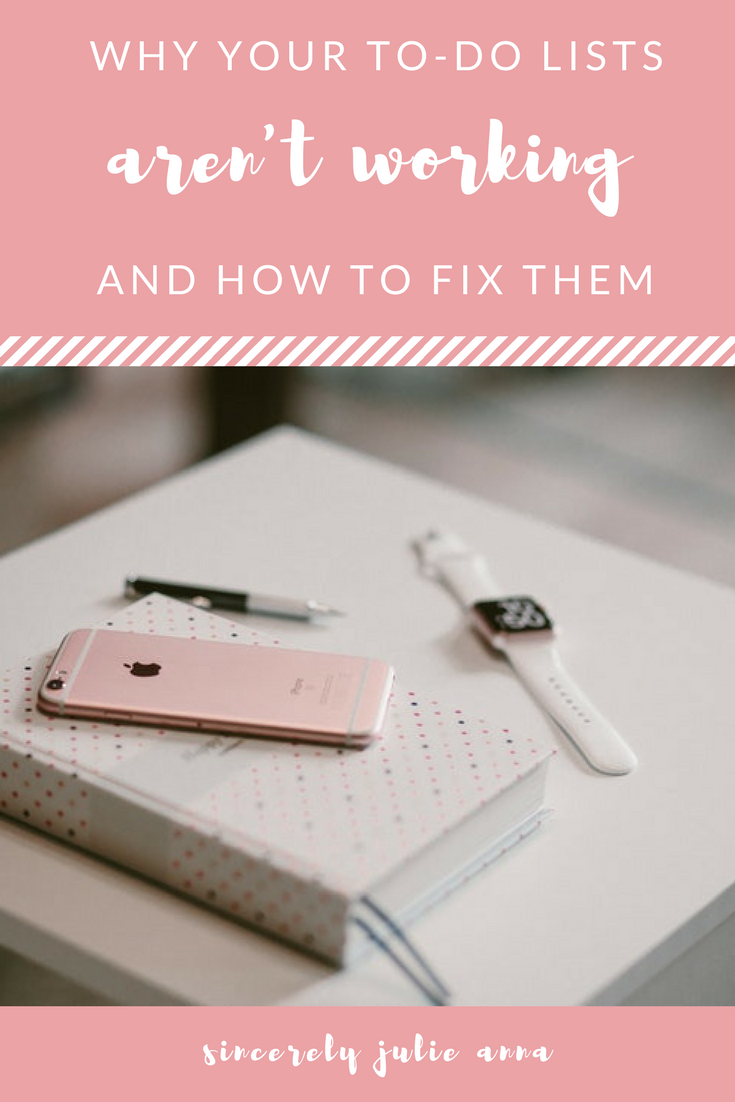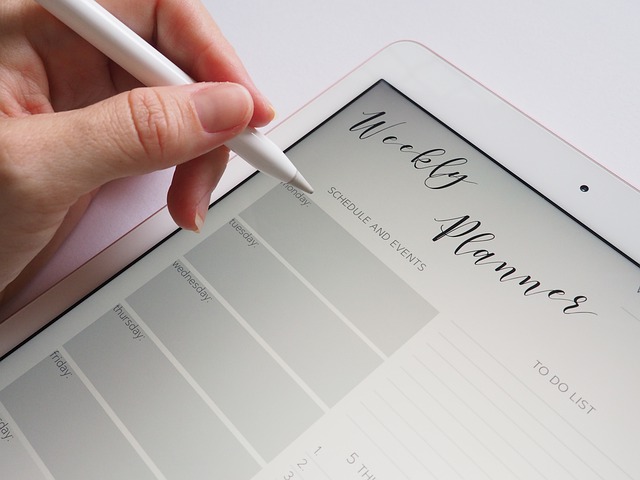To-do lists are arguably one of the best ways to facilitate productive work and keep track of the what’s expected of you. Writing down what’s on our minds can easily become the starting point for what we wish to achieve. In fact, studies have shown that people who write down their goals were more likely to achieve them. Applying this concept to our daily tasks, we can aspire to get a lot done. Sometimes, however, our to-do lists don’t always work for us, and we struggle to keep up with our work. And when this happens, it feels as though our to-do lists are working against us. If this is a consistent issue for you, keep reading to find out how you can make your to-do lists more effective.
You have too many tasks assigned.
It’s easy to overschedule yourself. In fact, it took me several years to learn how not to do this. If you have too much on your to-do list for one day, it will be nearly impossible to get through your list. Then you edit your to-do list for the days to come. This can make you overwhelmed at the fact that you’re not getting anything done. But the truth is, you are getting work done – but your to-do list is telling you that you aren’t. It’s as though you’re competing against your own to-do list – which means unnecessary stress for you.
In order to fix this, keep in mind how long these tasks may take. If the task in question is something you do on the regular, you can probably give a good estimate of how long it’ll take and be realistic. If it’s not something you’re as familiar with, it’s good to give yourself plenty of time to figure it out. Personally, I find underscheduling my to-do lists gives me peace of mind once I complete them. With the time I have left over, I’ll get started on what I intended to work on tomorrow.
You’re not giving yourself enough space for other circumstances.
What could be meant by “other circumstances” can be very varied based on what your to-do list is for. If you’re at work, this could mean a long chat with a co-worker, last-minute meeting, or your boss handed you a quick task that needed to be done ASAP. As you’re a college student, it could mean unscheduled study breaks with friends, finding a good place to study, or having internet connectivity issues. If you’re doing work at home, it could mean your child got sick at school, the dishwasher’s leaking, or the power went out.
As you can tell, there could be circumstances for any person at any time, good or bad. And if your to-do list is packed to the brim, just one distraction can keep you on edge. Even if the distraction is someone at the office bringing in donuts for a co-worker’s birthday, you’re not going to enjoy the break (or the donut!) because you’re going to be thinking about work the whole time. Again, it’s an unnecessary stressor that could be avoided.
When assigning tasks, be sure to leave yourself plenty of room so you can easily face the unexpected. I’d recommend again giving the impression that you’re underscheduling yourself, This way, if you do have those distractions, you’ll still get your work done for the day. And if you finish early, get started on tomorrow’s work.
You’re planning too far ahead.
If you are especially the type that has to deal with a lot of circumstances, it is in your best interest to not plan too far ahead. If you know that you deal with lots of changes, you end up wasting a lot of time making detailed plans that won’t stick. You could also feel frustrated knowing that you can never get what you planned for.
If you feel that you must plan somewhat ahead, make a rough list of everything expected of you over time. For each day, pull the next high-priority task off the list and add it to your to-do list. Your new “master list” is now a running record of all the things you must get done so you won’t forget. This also makes a much more simple “at-a-glance” plan than scribbling out old lists and potentially being unorganized.
Your tasks aren’t specific or broken down enough.
More than likely, your longer tasks will have a lot of parts associated with them. Let’s give the simple example of writing a research paper. It’s simple to describe what the project is, but if you break it down, it has a lot of parts. You have to pick a topic, do research, outline, write, cite, proofread, edit, and submit. If you want to write this paper the right way, you’ll have to keep track of all of those things. You’re probably also not going to want to do that all in one sitting (even if it’s very short).
In this kind of situation, many people will write on their list “write research paper.” But then it’ll say the same thing again for the next several days up until the due date. It works for some people just fine, but if you’re like me, you’ll feel highly unsettled and a little unorganized.
Instead, let’s break this down. It’s Friday and the paper is due next Friday. Not only that but you have to get the paper checked by the writing counselor. Let’s commit to picking a topic today and schedule a counselor appointment on Tuesday. On Saturday you’ll outline the paper, and on Sunday you’ll write it out with your citations. On Monday you’ll proofread your paper with a fresh mind, and on Tuesday you’ll take the paper to the writing counselor and work on finishing it together.
Had you not gone this route, it could have been easily put off longer because you didn’t have a specific plan in place. You wouldn’t have told yourself, I have to have this done on Sunday. That way, I can proofread it Monday, and have it done and ready for the counselor on Tuesday. You could have put all that off and scrambled for an appointment with the writing counselor at the last minute. You could have been up until midnight finishing it! But it’s easier to prevent yourself from dragging long-term work out if you create an individual, specified plan for it.
Everything on your to-do list has equal priorities.
In college, I liked sticking to what I wanted to get done instead of what should have been done first. The result? Well, I’d complete everything on time, but at the expense of doing the least-desired task fairly close to the deadline. Had I just got it done first, I wouldn’t have had that stress on me.
That’s when I started ordering my tasks. I knew that, over anything, I had to do a particular part of a project first. That way, if I was stuck for help, I would have more time for office hours. Now that I’m working, I can place priority on things that are expected of me more urgently.
So placing priority on tasks will do two very big things for you. For one, it eliminates stress by ensuring you’re not working to close to a deadline. It also forces you to work on the task that you’re dreading and give you that feeling of satisfaction once you’ve done it.
Planning isn’t a concise part of your routine.
At the end of each workday, I like to plan out what I have to get done tomorrow. I’ve found that, even if I wait to plan until the next morning, I’m not as productive.
If you’d like your to-do lists to work for you, be more consistent in when and how you plan. It is possible that you are just fine writing to-do lists only when you need them. But if you feel that you are not placing enough weight on occasional to-do lists, try turning planning into a routine and see if that leads to improvement.
You’re saying yes to too many things.
If you’ve worked through all of these things with no luck, consider how much you have on your plate. How much is too much for you? Are all of these things necessary to be doing right at this moment? Which of these tasks do you have a say in? Keep these questions in mind as new tasks come in. There’s only so much one person can handle, and as hard as it is to say no sometimes, it can be for the best.
As much as I love planning, sometimes it can lead to more stress and overwhelm than productive work and satisfaction. With these tips, I hope you can not achieve the latter more frequently! How do you like to plan for big projects? Let me know below.
Sincerely,
Julie Anna







Great post. I read an awful book by Timothy Ferris that had an excellent perspective on to-do lists. He said that your to-do list should basically be 1-3 things that are most important. That way if you only do those things, you will feel like you accomplished something that day. Then everything else is peripheral and basically bonus if you get done. It really helped me focus on my priorities since I tend to write everything down, so my to-do lists are gigantic most of the time.
Yes, I think I know which book you’re talking about! I like that method a lot – I definitely feel better having done a bigger task than all the smaller ones. I’ve heard all about his book and podcast but haven’t had a look yet. I’m interested to learn more about his methods – I’ll check it out!
I actually hated his book. He’s a narcisstic jerk. But he did have a few pieces of advice. I wouldn’t recommend him overall, though.
Aw, really? I feel like I’ve been enduring or hearing about that a lot lately. Even a few books I’ve read where they’re so known and popular and then you read them and their overall attitude and demeanor is disappointing! I guess at least you were able to benefit from it in some way!
Brilliant post! I actually really needed to read this today. I’m in the middle of planning my wedding and I have to do lists all over my house! This will really help me get my thoughts in order.x
I’m so happy I could help!
I’m definitely guilty of writing really long to do lists and then feeling like I haven’t accomplished anything at the end of the day. I need to be more reasonable with the amount of things I write on my lists.
Aleeha xXx
http://www.halesaaw.co.uk/
I have the habit of doing this all the time because I’m nervous about forgetting something. Which is why I started doing the ‘master list’ solution – I hope that helps you too!